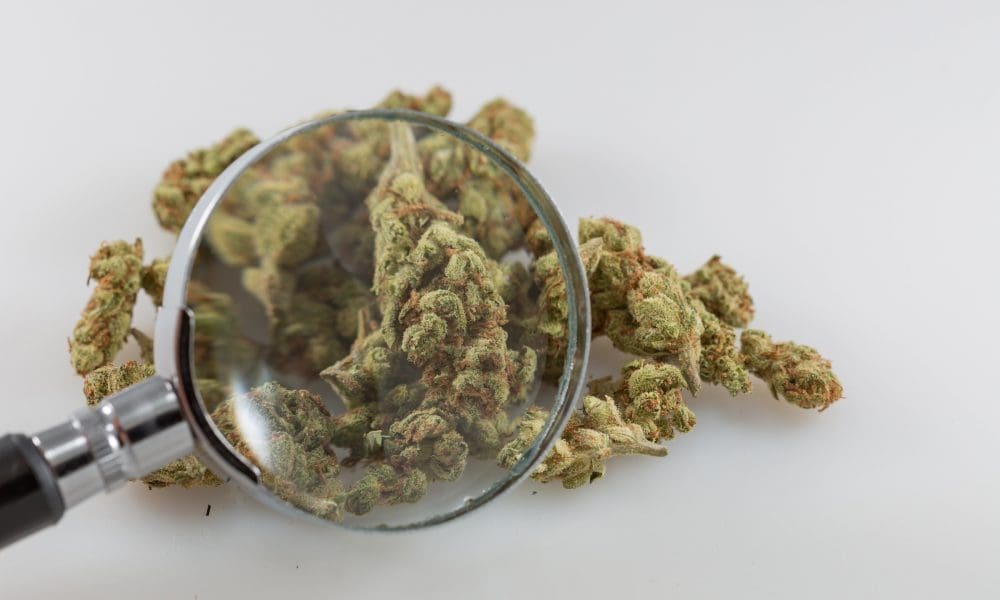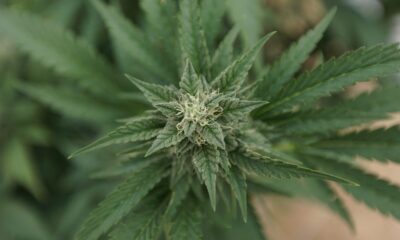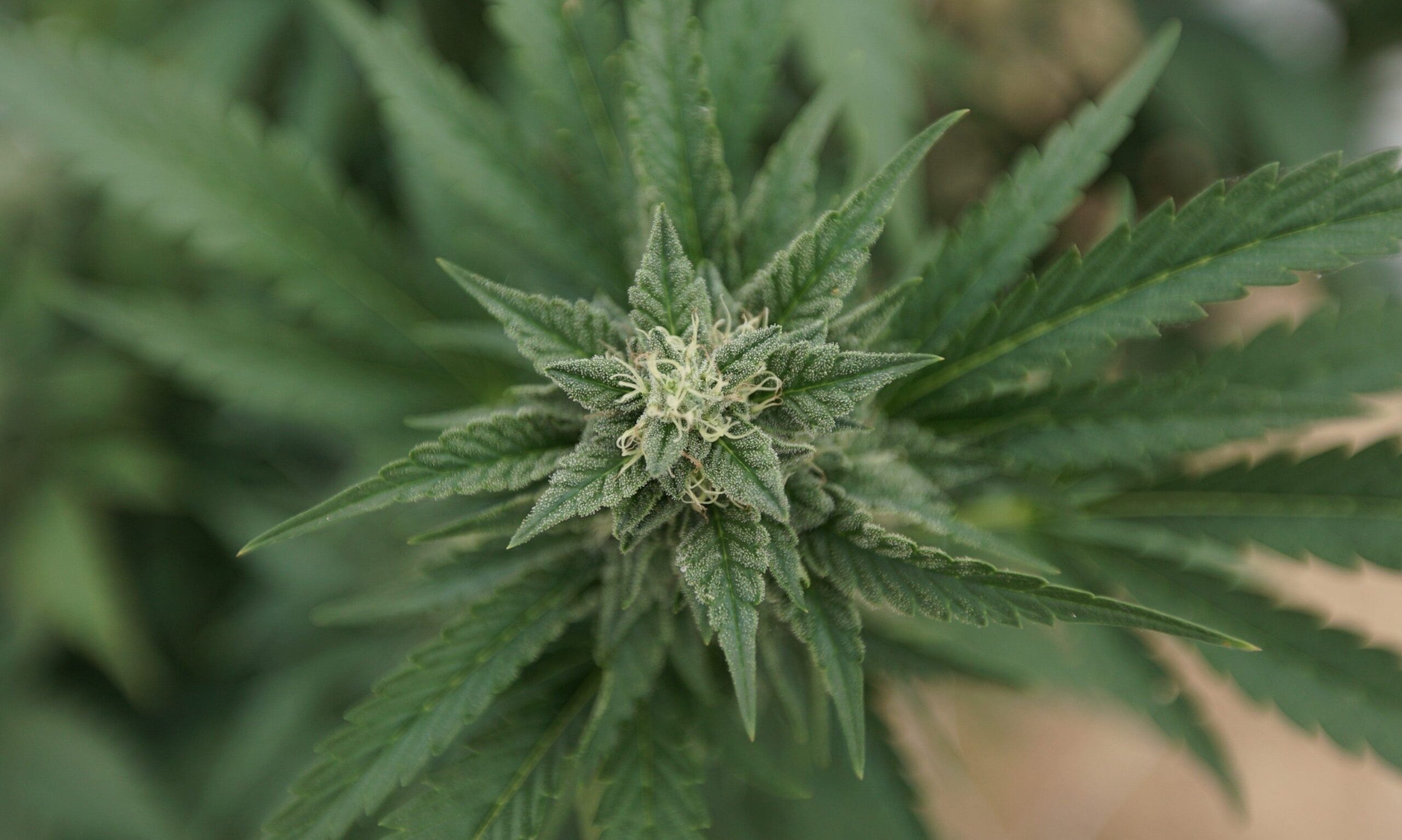featured
Medical Marijuana Effectively Treats Pain, With Terpenoids Being ‘More Influential’ Than THC Or CBD, Study Shows
Published
2 days agoon

Medical marijuana has “genuine therapeutic effects for pain management,” and the degree of relief provided by cannabis can be predicted by their specific chemical profile—including not only cannabinoids but also, crucially, terpenoids—according to a newly published study employing machine learning methods.
It’s a conclusion that researchers say provides “evidence for compound-specific therapeutic effects.”
“These results highlight the importance of considering the full range of cannabis compounds when developing more precise and effective cannabis-based therapies for pain management,” says the report, published in the journal Communications Medicine.
It also furthers the notion that at least some combinations of the many compounds in cannabis work in concert to provide heightened relief—a concept known as the entourage effect.
An underlying goal of the research was contribute to the ongoing scientific debate “whether cannabis truly reduces pain or if patients feel better simply because they expect it to work (placebo effect),” authors explained. To do that, they looked at 329 medical marijuana patients and analyzed the chemical makeup of the products they used.
“We found that patients’ pain improvement could be predicted from the chemical content of their cannabis, even though patients didn’t know what chemicals they were receiving,” the team wrote. “This suggests that cannabis provides real pain relief beyond just patient expectations.”
“Pain relief can be predicted from cannabis chemical profiles that are unknown to patients, providing evidence for compound-specific therapeutic effects.”
One notable finding in the new research is that primary cannabinoids THC and CBD offered only “limited predictive value” of a product’s pain relieving effects. Other minor compounds, specifically alpha-Bisabolol and eucalyptol, instead emerged as “key predictors of treatment response.”
“An unexpected finding was the relatively minimal impact of well-known cannabinoids such as THC and CBD on pain relief outcomes, which stands in contrast to popular belief and previous reports,” the study says. “While THC and CBD are often highlighted for their therapeutic potential, our analysis revealed other compounds, including α-Bisabolol and eucalyptol, as more influential in the context of pain relief.”
As for the entourage effect, the report suggests that “specific combinations of compounds” work better at managing pain than individual chemical components.
“These findings show that medical cannabis has genuine therapeutic effects for pain management.”
“The complex relationship we observed between cannabis composition and pain relief helps explain why previous studies focusing on individual compounds have often shown mixed results,” the study says. “Our analysis suggests that therapeutic effects emerge from specific combinations of compounds working in concert, rather than from any single component.”
“This complexity in [medical cannabis’s] mechanism of action emphasizes the importance of considering the full chemical profile when investigating cannabis therapeutic properties,” it adds.
Overall, researchers—a six-person team from Technion-Israel Institute of Technology, in Haifa, Israel—said the findings also provide further evidence of medical marijuana’s analgesic properties.
“The fact that treatment outcomes were predictable from chemical composition supports the growing body of evidence for genuine pharmacological analgesia,” they wrote, “while acknowledging that expectation and context effects also contribute to therapeutic outcomes in clinical practice.”
“Our study provides compelling evidence that the efficacy of [medical cannabis] in pain relief is not merely a placebo response but is strongly influenced by its diverse chemical composition.”
The new paper contributes to a growing body of research supporting the use of marijuana as treatment for pain.
For example, a study published recently in the journal Pharmacy found that patients with chronic pain who used marijuana for at least one year “exhibited significantly lower healthcare utilization” compared to non-users, reporting fewer visits to urgent care and emergency departments (EDs) as well as a higher quality of life.
Hospitalization rates were also lower among chronic pain patients who used medical marijuana, the report found, though not enough to be statistically significant.
“Exposure [to cannabis] was associated with a 2.0 percentage point reduction in urgent care visits, a 3.2 percentage point reduction in ED visits and fewer unhealthy days per month,” said the report, authored by researchers at the Miami-based cannabis telehealth company Leafwell and George Mason University in Virginia.
“The findings of this study suggest, in line with existing research, that medical cannabis is likely an effective treatment option for patients with chronic pain,” authors wrote. “This underscores the potential for not only [quality of life] gains associated with medical cannabis use, but also positive downstream effects on the healthcare system resulting from treatment.”
Another study published earlier this year found that more than 8 in 10 patients who used medical marijuana reported it to be a useful tool for pain management.
Published in May in the journal Cureus, the report stemmed from a survey of 129 people who were medical marijuana patients in Pennsylvania between October 2022 and December 2024. It said it “provides important insights into the real-world patterns, perceived efficacy, and cognitive effects of medical cannabis use among individuals with chronic musculoskeletal pain who employ cannabis regularly over extended periods.”
“Over 80 percent of patients who turned to medical cannabis found it effective for managing their pain,” co-author Mohammad Khak, a researcher at the Rothman Opioid Foundation, said in a press release at the time.
Past research has suggested that a variety of cannabinoids—including CBD and others—may help ease pain symptoms. A study published in February, for example, found that marijuana and its cannabinoid components may be useful treatments for various types of chronic pain, in some cases helping to reduce the use of other medications
The paper also said select mixtures of cannabinoids—such as cannabichromene (CBC) and cannabigerol (CBG)—could have other benefits, including minimizing undesirable effects like the psychoactivity of THC.
All told, more than 180 different cannabinoids have now been isolated from the cannabis plant, the report noted, often interacting with different parts of the body. CBD and THC, for example, “have a wide potential for therapeutic effects based on their multiple molecular targets including ion channels, receptors, transporters and enzymes.”
“The two most abundant and studied cannabinoids, THC and CBD, along with an understudied cannabinoid, cannabigerol (CBG), have been shown, in our laboratories, to reduce neuropathic pain in animal models,” authors wrote, recommending that further study “into cannabinoids like THC, CBD and CBG should focus on the optimal therapeutic doses and the effects these cannabinoids can have on the management of chronic neuropathic pain in humans.”
Separate research published earlier this year in the journal Pain found that marijuana was “comparatively more effective than prescription medications” for treating chronic pain after a three-month period, and that many patients reduced their use of opioid painkillers while using cannabis.
The analysis “was able to determine, using causal inference techniques, that use of medical marijuana for chronic pain under medical supervision is at least as effective and potentially more effective in relationship to patients with chronic pain treated by prescription medications (nonopioid or opioid),” said the report, by authors at the University of Pittsburgh, Harvard Medical School and the National Cancer Institute.
A recent federally funded study, meanwhile, found that legalization of marijuana in U.S. states is associated with reduced prescriptions for opioid pain medications among commercially insured adults—indicating a possible substitution effect where patients are choosing to use cannabis instead of prescription drugs to treat pain.
“These results suggest that substitution of cannabis for traditional pain medications increases as the availability of recreational cannabis increases,” authors of that report wrote, noting that there “appears to be a small shift once recreational cannabis becomes legal, but we see stronger results once users can purchase cannabis at recreational dispensaries.”
“Reductions in opioid prescription fills stemming from recreational cannabis legalization may prevent exposure to opioids in patients with pain,” the paper, published in the journal Cannabis, continues, “and lead to decreases in the number of new opioid users, rates of opioid use disorder, and related harms.”
Other recent research also showed a decline in fatal opioid overdoses in jurisdictions where marijuana was legalized for adults. That study found a “consistent negative relationship” between legalization and fatal overdoses, with more significant effects in states that legalized cannabis earlier in the opioid crisis. Authors estimated that recreational marijuana legalization “is associated with a decrease of approximately 3.5 deaths per 100,000 individuals.”
“Our findings suggest that broadening recreational marijuana access could help address the opioid epidemic,” that report said. “Previous research largely indicates that marijuana (primarily for medical use) can reduce opioid prescriptions, and we find it may also successfully reduce overdose deaths.”
“Further, this effect increases with earlier implementation of [recreational marijuana legalization],” it added, “indicating this relationship is relatively consistent over time.”
Another recently published report into prescription opioid use in Utah following the state’s legalization of medical marijuana found that the availability of legal cannabis both reduced opioid use by patients with chronic pain and helped drive down prescription overdose deaths statewide. Overall, results of the study indicated that “cannabis has a substantial role to play in pain management and the reduction of opioid use,” it said.
Yet another study, published in 2023, linked medical marijuana use to lower pain levels and reduced dependence on opioids and other prescription medications. And another, published by the American Medical Association (AMA) last February, found that chronic pain patients who received medical marijuana for longer than a month saw significant reductions in prescribed opioids.
About one in three chronic pain patients reported using cannabis as a treatment option, according to a 2023 AMA-published report. Most of that group said they used cannabis as a substitute for other pain medications, including opioids.
Other research published that year found that letting people buy CBD legally significantly reduced opioid prescription rates, leading to 6.6 percent to 8.1 percent fewer opioid prescriptions.
A 2022 research paper that analyzed Medicaid data on prescription drugs, meanwhile, found that legalizing marijuana for adult use was associated with “significant reductions” in the use of prescription drugs for the treatment of multiple conditions.
A 2023 report linked state-level medical marijuana legalization to reduced opioid payouts to doctors—another datapoint suggesting that patients use cannabis as an alternative to prescription drugs when given legal access.
Researchers in another study, published last year, looked at opioid prescription and mortality rates in Oregon, finding that nearby access to retail marijuana moderately reduced opioid prescriptions, though they observed no corresponding drop in opioid-related deaths.
Other recent research also indicates that cannabis may be an effective substitute for opioids in terms of pain management.
A report published recently in the journal BMJ Open, for instance, compared medical marijuana and opioids for chronic non-cancer pain and found that cannabis “may be similarly effective and result in fewer discontinuations than opioids,” potentially offering comparable relief with a lower likelihood of adverse effects.
Separate research published found that more than half (57 percent) of patients with chronic musculoskeletal pain said cannabis was more effective than other analgesic medications, while 40 percent reported reducing their use of other painkillers since they began using marijuana.
In Minnesota, meanwhile, a state government report this year on chronic pain patients enrolled in the state’s medical marijuana program said recently that participants “are finding a noticeable change in pain relief” within a few months of starting cannabis treatment.
The large-scale study of nearly 10,000 patients also shows that nearly a quarter who were taking other pain relievers reduced the use of those drugs after using medical marijuana.
Another new study on the use of medical marijuana by older patients—age 50 and above—concluded that “cannabis seemed to be a safe and effective treatment” for pain and other conditions.
A separate presentation reviewing research on student athletes’ use of cannabis recently found that marijuana “has demonstrated positive findings as an alternative for pain management among NCAA athletes.”
Yet another study found that 40 percent of military veterans suffering from chronic pain reported using marijuana to treat their symptoms.
Most of them said they use cannabis to deal with pain, mobility and sleep issues, while substantial numbers of veterans also said it helps with PTSD, anxiety and stress. Nearly all participants (98 percent) said healthcare providers should discuss the use of natural products with their patients.

Author: mscannabiz.com
MScannaBIZ for all you Mississippi Cannabis News and Information.
You may like
-


Klutch Cannabis Opening 5th Ohio Dispensary in Northfield
-


Undercover video exposes illegal THC sales at North Texas vape shops
-


Book Review: The Traveling Cannabis Writer’s Guide to America’s Hidden Gems
-


WKRN: marijuana reclassification impact
-


Texas Senators Unanimously Pass Hemp THC Ban Bill Hours After Governor Convenes Second Special Session
-


New York’s cannabis agency allowed dispensaries to open too close to schools | Videos
featured
Klutch Cannabis Opening 5th Ohio Dispensary in Northfield
Published
12 minutes agoon
August 15, 2025
[PRESS RELEASE] – NORTHFIELD VILLAGE, Ohio, Aug. 15, 2025 – Klutch Cannabis, one of Ohio’s leading vertically integrated cannabis companies, announced the grand opening of its newest dispensary, located at 10650 Northfield Road in Northfield Village, Ohio. Doors will officially open at 10 a.m. Aug. 21, 2025.
The new location marks Klutch’s first dispensary in Summit County, where the company is headquartered. Conveniently situated directly across the street from the MGM Northfield Park Casino and Racetrack, the dispensary is easily accessible from Route 8 and I-271, finally bringing much-needed access to medical cannabis patients and adult-use consumers in Northern Summit County communities, including Northfield Village, Macedonia, Northfield Center Township, Twinsburg, Hudson, Sagamore Hills, Boston Township, Richfield Township, Bath Township, and more.
The expansion further solidifies Klutch’s retail footprint in Northeast Ohio and represents an important milestone as the company begins delivering its renowned top-shelf products on its home turf. Offerings will include exclusive drops and limited releases along with customer favorites from the company’s Klutch Cannabis and Habitat by Klutch lines, its Ohio-exclusive brand partners, and other Ohio cannabis companies. The Northfield dispensary will also feature Klutch’s signature aesthetic and exceptional customer service, as well as a convenient drive-thru pickup window for pre-orders.
Hours of operation for the new Northfield Village location will be:
- 10 a.m. to 10:45 p.m. Thursday through Saturday
- 10 a.m. to 10 p.m. Sunday through Wednesday
“We’re incredibly excited to expand Klutch Cannabis’s retail footprint to Summit County,” Klutch founder and CEO Adam Thomarios said. “This location has been years in the making and will finally provide patients and adult-use customers in Northern Summit County with access to the quality, care, and consistency that Klutch is known for. Our thanks go out, especially, to the community, administration, and officials in Northfield Village for being such great partners from the start. The Village is a great place to do business, and we can’t wait to start making a positive impact in the community.”
For more information about Klutch Cannabis, its dispensaries, and its award-winning products, visit KlutchCannabis.com and HabitatbyKlutch.com or follow @KlutchxCommunity and @HabitatbyKlutch on Instagram.

Author: mscannabiz.com
MScannaBIZ for all you Mississippi Cannabis News and Information.
featured
Book Review: The Traveling Cannabis Writer’s Guide to America’s Hidden Gems
Published
1 hour agoon
August 15, 2025
Every so often, a cannabis book comes along that feels like it has been missing from the shelf for years. Veronica “Vee” Castillo’s Cannabis Legacy Chronicles Series: The Traveling Cannabis Writer’s Guide to America’s Hidden Gems – Part 1: The 30,000-Foot View is one of those rare finds.
We read it cover to cover and it is clear: Vee has built something more than a travelogue. This is six years of crisscrossing the United States, living out of suitcases, rental cars, and guest rooms, documenting over 200 stories that mainstream media rarely touches.
The book brims with voices from every corner of the cannabis map: Black, Brown, and woman-owned businesses, legacy cultivators preserving genetics through prohibition, Caribbean entrepreneurs blending tradition with modern cannabis tourism, and women who left corporate jobs to open dispensaries, grow medicine, and build communities.
What sets it apart is Vee’s perspective. She writes like someone who has been in the grow rooms, sat at the kitchen tables, and walked the fields, not parachuting in for a quick profile but staying long enough to see the heartbeat of each place. Her chapters on women innovators, cultural preservation, and equity-driven tourism do not just inform, they inspire.
This is not a story about cannabis, the commodity. It is about cannabis, the connector.
If you care about the soul of this industry, if you want to see the people and places that make cannabis culture rich and resilient, this book delivers. It is equal parts history, advocacy, and celebration, wrapped in storytelling that is as authentic as it gets.
Vee will soon be bringing that same depth of reporting to High Times, and if Cannabis Legacy Chronicles is any indication, readers are in for something special.
We cannot recommend it enough. Grab your copy of Cannabis Legacy Chronicles: Part 1 here and see why we are so excited to welcome her to the High Times family.

Author: mscannabiz.com
MScannaBIZ for all you Mississippi Cannabis News and Information.
featured
Texas Senators Unanimously Pass Hemp THC Ban Bill Hours After Governor Convenes Second Special Session
Published
2 hours agoon
August 15, 2025
The governor of Texas has convened another special session—again directing lawmakers to advance legislation regulating consumable hemp and setting an age limit to access cannabinoids. Within hours, a Senate committee quickly and unanimously approved a reintroduced bill that would simply ban hemp THC products in contravention of Gov. Greg Abbott’s (R) call for regulation.
After Democratic House lawmakers staged a walkout during the first special session Abbott convened—denying the chamber a quorum in protest of a proposed redistricting plan for the state’s congressional map—the governor on Friday issued a proclamation to start a second special session. The session cannot last longer than 30 days under the state constitution, but there’s no limit on how many can be called.
On the same day Abbott declared the new session, the Senate State Affairs Committee quickly passed a reintroduced hemp bill from Sen. Charles Perry (R) in a 9-0 vote.
The legislation would continue to outright ban cannabis products with “any amount” of cannabinoids other the CBD and CBG. Even mere possession of a prohibited cannabis item would be punishable as a Class B misdemeanor, carrying up to 180 days in jail and a $2,000 fine.
The governor’s latest proclamation also renews his call for legislation “making it a crime to provide hemp-derived products to children under 21.”
But while Perry’s bill that moved through committee would impose a complete ban on hemp containing any THC, Abbott said in his latest proclamation that he wanted to see a measure sent to his desk that would “comprehensively regulate hemp-derived products, including limiting potency, restricting synthetically modified compounds, and establishing enforcement mechanisms, all without banning lawful hemp-derived products.”
Heather Fazio, director of the advocacy group Texas Cannabis Policy Center, told Marijuana Moment on Friday that the group is “disappointed to see the senate suspend their own rules to circumvent public notice requirements, disenfranchising the many Texans who would have testified in opposition to SB 6.”
“This is yet another sweeping ban on THC products,” she said. “Most Texans agree with Governor Abbott: The Texas legislature should regulate, not ban, THC products.”
(Disclosure: Fazio supports Marijuana Moment’s work via monthly Patreon pledges.)
An initial version of the governor’s new proclamation for the second special session said cannabinoid products should be age-gated to prohibit access for people under 18, but that was quickly revised and republished with the age limit of 21—similar to the call for the prior special session—for reasons that are unclear.
The proclamation for the new session also specifies that regulations should not ban “lawful hemp-derived products,” whereas the proclamation for the first session referenced a “lawful agricultural commodity.”
Special Session #2 begins immediately.
There is critical work that is left undone.
Texas will not back down from this fight.
That’s why I am calling them back today to finish the job.
Read my Special Session #2 agenda here: https://t.co/z9i949oQCw pic.twitter.com/jVE4S9hHAS
— Greg Abbott (@GregAbbott_TX) August 15, 2025
Hemp advocates and industry stakeholders say that would effectively eradicate the state’s market, as there are very few businesses that manufacture isolated CBD or CBG products that contain no traces to THC or other cannabinoids. Federal law allows hemp products containing up to 0.3 percent THC by dry weight.
A similar bill from Perry passed the Senate during the first special session but did not advance in the House.
The other new bill filed for the second special session from Rep. Charlie Geren (R) would follow the governor’s directive to make it so consumable hemp products could only be purchased by adults 21 and older.
Ahead of the end of the first special session, the House Public Health Committee took up the prior bill to ban consumable hemp products containing THC, without taking action on it.
Abbott vetoed an earlier version of the controversial proposal that passed during this year’s regular session, and he more recently outlined what he’d like to see in a revised version of the bill.
Some, including Lt. Gov. Dan Patrick (R) and Senate bill sponsor Perry, have insisted that an outright ban is a public safety imperative to rid the state of intoxicating products that have proliferated since the crop was federally legalized in 2018. Others say the legislature should instead enact regulations for the market to prevent youth access while still allowing adults 21 and older to access the products and preserving the massive industry.
—
Marijuana Moment is tracking hundreds of cannabis, psychedelics and drug policy bills in state legislatures and Congress this year. Patreon supporters pledging at least $25/month get access to our interactive maps, charts and hearing calendar so they don’t miss any developments.![]()
Learn more about our marijuana bill tracker and become a supporter on Patreon to get access.
—
Meanwhile, Abbott in June signed a bill into law that expanded the state’s list of medical cannabis qualifying conditions, adding chronic pain, traumatic brain injury (TBI), Crohn’s disease and other inflammatory bowel diseases, while also allowing end-of-life patients in palliative or hospice care to use marijuana.
Texas officials took another step toward implementing that law this week—posting a draft of proposed rules to let physicians recommend new qualifying conditions for cannabis and create standards for allowable inhalation devices.
That came about a week after the the Department of Public Safety (DPS) previewed a separate set of rules to increase the number of licensed dispensaries under recently passed legislation.
During the first special session, Rep. Nicole Collier (D) introduced a one-page bill, HB 42, designed to protect consumers in the state from criminal charges if what they believed was a legal hemp product turned out to contain excessive amounts of THC, making it illegal marijuana. It would prevent the criminalization of someone found in possession of a product that’s labeled as hemp but is determined to contain “a controlled substance or marihuana.”
In order for the person to obtain the legal protection, the product would need to have been purchased “from a retailer the person reasonably believed was authorized to sell a consumable hemp product.”
Another bill—HB 195, introduced by Rep. Jessica González (D)—would legalize marijuana for people 21 and older, allowing possession of up to 2.5 ounces of cannabis, with no more than 15 grams of that amount being in concentrated form.
Yet another proposal would order state officials to conduct a study on testing for THC intoxication.
As for what Texans themselves want to see from their representatives, proponents of reining in the largely unregulated intoxicating hemp industry in Texas shared new polling data indicating that majorities of respondents from both major political parties support outlawing synthetic cannabinoids, such as delta-8 THC.
The survey also found that respondents would rather obtain therapeutic cannabis products through a state-licensed medical marijuana program than from a “smoke shop selling unregulated and untested hemp.”
Ahead of the governor’s veto in June of SB 3—the earlier hemp product ban—advocates and stakeholders had delivered more than 100,000 petition signatures asking Abbott to reject the measure. Critics argued that the industry—which employs an estimated 53,000 people—would be decimated if the measure became law.
Photo courtesy of Chris Wallis // Side Pocket Images.

Author: mscannabiz.com
MScannaBIZ for all you Mississippi Cannabis News and Information.

Klutch Cannabis Opening 5th Ohio Dispensary in Northfield

Undercover video exposes illegal THC sales at North Texas vape shops

Book Review: The Traveling Cannabis Writer’s Guide to America’s Hidden Gems

WKRN: marijuana reclassification impact

Texas Senators Unanimously Pass Hemp THC Ban Bill Hours After Governor Convenes Second Special Session

New York’s cannabis agency allowed dispensaries to open too close to schools | Videos

Texas, California Governors Collide Over Redistricting; Hemp Lies in the Crosshairs

Texas Lawmakers Will Continue Pursuing Hemp Product Restrictions In Second Special Session

Over 2,000 plants uncovered at marijuana grow-op in Brantford

Trucking Industry Group Is ‘Deeply Concerned’ About Marijuana Rescheduling’s Potential Impact On Drug Testing For Drivers

The Best Late Summer Cocktails

#1to3: The Social Media Campaign Urging Trump To Reschedule Cannabis — And How You Can Help

Report Predicts Global Psychedelic Drugs Market Will Reach $22.6B by 2033

New York allowed pot shops to open too close to schools. Now they might have to move

Medical Marijuana ‘Significantly’ Decreases Use Of Opioids By Chronic Pain Patients, New Study Finds

Trump signals push to finish Biden’s marijuana reform

Senator Secures Half A Million Dollars For Research On Hemp, Calling It ‘One Of The Oldest And Most Versatile Crops In Agriculture’

Take in the open house celebration of the fifth Klutch Cannabis dispensary location in Ohio

Trump’s MAGA base is torn over cannabis rescheduling (Newsletter: August 15, 2025)

Trump Might Reclassify Marijuana. He Should Do This Instead

OMMA says recent cannabis product retest is an immediate public health and safety risk | News

From The Vault: DEAL for REAL (1978)

Court throws out part of New York’s marijuana licensing rules

Marijuana Is A ‘Promising Treatment’ For Women Struggling To Achieve Orgasm, Scientific Review Shows

Alert: Department of Cannabis Control updates data dashboards with full data for 2023

Connecticut Appoints The US’s First Cannabis Ombudsperson – Yes there is a pun in there and I’m Sure Erin Kirk Is Going To Hear It More Than Once!

5 best CBD creams of 2024 by Leafly

EU initiative begins bid to open access to psychedelic therapies
New Study Analyzes the Effects of THCV, CBD on Weight Loss

Free delta-9 gummies from Bay Smokes

5 best autoflower seed banks of 2024 by Leafly

Discover New York’s dankest cannabis brands [September 2024]

Curaleaf Start Process Of Getting Their Claws Into The UK’s National Health System – With Former MP (Resigned Today 30/5/24) As The Front Man

May 2024 Leafly HighLight: Pink Runtz strain

Mississippi city official pleads guilty to selling fake CBD products

Local medical cannabis dispensary reacts to MSDH pulling Rapid Analytics License – WLBT

Press Release: CANNRA Calls for Farm Bill to Clarify Existing State Authority to Regulate Hemp Products

Horn Lake denies cannabis dispensary request to allow sale of drug paraphernalia and Sunday sales | News

5 best THC drinks of 2024 by Leafly

Nevada CCB to Accept Applications for Cannabis Establishments in White Pine County – “Only one cultivation and one production license will be awarded in White Pine County”

6 best CBD gummies of 2024 by Leafly

The Daily Hit: October 2, 2024

5 best delta-9 THC gummies of 2024 by Leafly

Weekly Update: Monday, May 13, 2024 including, New Guide for Renewals & May Board meeting application deadline

PRESS RELEASE : Justice Department Submits Proposed Regulation to Reschedule Marijuana

People In This State Googled ‘Medical Marijuana’ The Most, Study Shows

Thailand: Pro-cannabis advocates rally ahead of the government’s plan to recriminalize the plant

5 best THCA flower of 2024 by Leafly
Trending
-

 California Cannabis Updates1 year ago
California Cannabis Updates1 year agoAlert: Department of Cannabis Control updates data dashboards with full data for 2023
-

 Breaking News1 year ago
Breaking News1 year agoConnecticut Appoints The US’s First Cannabis Ombudsperson – Yes there is a pun in there and I’m Sure Erin Kirk Is Going To Hear It More Than Once!
-

 best list1 year ago
best list1 year ago5 best CBD creams of 2024 by Leafly
-

 Business11 months ago
Business11 months agoEU initiative begins bid to open access to psychedelic therapies
-

 cbd1 year ago
cbd1 year agoNew Study Analyzes the Effects of THCV, CBD on Weight Loss
-

 Bay Smokes1 year ago
Bay Smokes1 year agoFree delta-9 gummies from Bay Smokes
-

 autoflower seeds11 months ago
autoflower seeds11 months ago5 best autoflower seed banks of 2024 by Leafly
-

 cannabis brands11 months ago
cannabis brands11 months agoDiscover New York’s dankest cannabis brands [September 2024]




